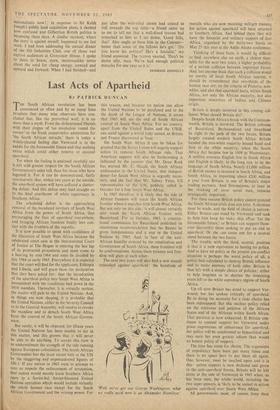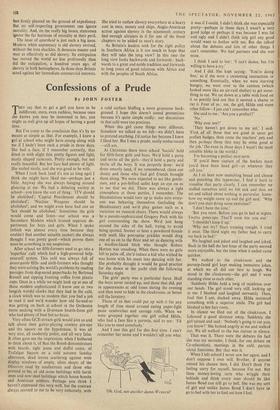Last Acts of Apartheid
HE South African revolution has been 1 announced so often and by so many false prophets that many wise observers have con- cluded that, like the proverbial wolf, it is no more than a myth. From the disheartened liberals with their slogan of `no revolution round the corner' to the frank conservative admiration for `the South African miracle,' there is today a widely-shared feeling that Verwoerd is in the saddle for the foreseeable future and that nothing exists which could either remove or succeed apartheid., Yet when the feeling is analysed carefully one is left with greater respect for the South African Government's sales talk than for those who have ingested it. For it can be demonstrated, fairly conclusively, that, within two years at the outside, the apartheid system will have suffered a shatter- ing defeat. And this defeat may lead straight on to the final overthrow of white supremacy in Southern Africa.
The scheduled defeat is the approaching removal of the mandated territory of South West Africa from the power of South Africa, thus encouraging the foes of apartheid everywhere, and bringing African freedom finally into con- tact with the frontiers of the republic.
It is now possible to speak with confidence of the liberation of South West Africa because the celebrated court case at the International Court of Justice at The Hague is entering the last lap of its protracted procedures and must come to a hearing by mid-1964 and must be decided by late 1964 or early 1965. Everywhere it is expected that the court will find for the applicants, Ethiopia and Liberia, and will grant them the declaration that they have asked for: that the introduction of the apartheid policy into South West Africa is inconsistent with the conditions laid down in the 1919 mandate. Thereafter, it is virtually certain, the matter will pas to the United Nations. And, as things are now shaping, it is probable that the United Nations, either in the Security Council or in the General Assembly, will resolve to revoke the mandate and to detach South West Africa from the control of the South African Govern- ment.
But surely, it will be objected, for lifteen years the United Nations has been unable to act in this matter, and this proves that it will never be able to do anything. To accept this view is to underestimate the strength of the tide running against European colonialism. The South African Government lost the most recent vote at the UN by the staggering and unprecedented figures of 106-1. If any nation in 1965 were to attempt to veto or impede the enforcement of revocation, that nation would merely leave Southern Africa open to a Soviet-led, Soviet-financed United Nations operation which would include virtually the whole human race except for the South African Government and the vetoing power. For this reason, and because no nation can allow the United Nations to be paralysed and to die the death of the League of Nations, it seems that 1965 will see the end of South African control of South West Africa. For no country, apart from the United States and the USSR, can stand against a world truly united, as Britain and France discovered at Suez.
On South West Africa it can be taken for granted that the Soviet Union will eagerly support action to remove South African rule. That American support will also be forthcoming is indicated by the rumour that Mr. Dean Rusk has warned Mr. C. Nand& the South African ambassador to the United States, that indepen- dence for South West Africa is urgently neces- sary, and the fact that Mr. Sidney Yates, US representative to the UN, publicly called in October for a free South West Africa.
In 1965 therefore, it is likely that the tide of African freedom will reach the South. African frontier where it marches with South West Africa. But not only on this side : it will almost certainly also reach the South African frontier with Basutoland. For in Octnber, 1963, a constitu- tional commission for Basutoland published its unanimous recommendation that the Basuto be given independence and a seat in the United Nations by 1965. And, in face of the anti- African hostility evinced by the constitution and Government of South Africa, these frontiers will be confrontations. Across them tyranny and free- dom will glare at each other.
The next two years will also find a new assault unleashed against apartheid: the hundreds of
'Well, we've got our George Washington; what we really need now is an Alexander Hamilton.'
recruits who are now receiving military training for action against apartheid will have returned to Southern Africa. And behind them they will have the financial and military support of free Africa, organised by the thirty-two States on May 25 this year at the Addis Ababa conference.
Thinking of these facts, it would bc difficult to find, anywhere else on earth, a clearer time- table for the next two years, a higher probability of a serious collision between important forces. And, lest anyone think that such a collision would be merely of local South African interest, it should be remembered that two-thirds of the human race are, on the criteria of Pretoria, non- white; and also that apartheid hurts, within South Africa, not only the African majority, but also important minorities of Indian and Chinese origin.
Britain is deeply involved in this coming col- lision. What should Britain do?
Despite South Africa's break with the Common- wealth, Britain is involved. The British colonies of Basutoland, Bechuanaland and Swaziland lie right in the path of the two forces. Britain largely created modern South Africa. Britain handed the non-white majority bound hand and foot to the white majority, when the South Africa Act became law in 1909 at Westminster. A million overseas English live in South Africa and English is likely, in the long run, to be the language of South Africa. Nearly £1,000 million of British money is invested in South Africa, and South Africa, in. importing about £200 million a year from Britain, is one of Britain's major trading partners. And Simonstown, at least in the thinking of some naval then, remains strategically important.
For these reasons British policy cannot pretend the South African crisis does not exist. A decision must be made, and the field of choice is narrow. Either Britain can stand by Verwoerd and seek to help him keep his leaky ship afloat 'for the foreseeable future,' or Britain can support (how- ever discreetly) those seeking to put an end to apartheid. Or she can come out for a neutral stand between the two forces.
The trouble with the third, neutral, position is that it is now equivalent to having no policy. And to have no policy in the present pre-conflict situation is perhaps the worst policy of all, a policy best calculated to destroy British influence and to make enemies of both sides. Britain is thus left with a simple choice of policies: either to help lengthen or to shorten the remaining years left to the white supremacy regime of South Africa.
Up till now Britain has acted to support Ver- woerd, but has spoken critically of apartheid. By so doing the necessity fora clear choice has been sidestepped. But this unclear policy relied on the tolerance and patience of the African States and of the Africans within South Africa. That patience is now exhausted. If Britain con- tinues to conceal support for Verwoerd under pious expressions of abhorrence for apartheid, her policy will be condemned as hypocritical and may earn her even greater odium than would an honest policy of support.
The time has come for choice. The arguments of expediency have been put many times and there is no space here to put them all again. One, however, must be touched upon and it is this : unless support is now declared and given to the.anti-apartheid forces, Britain will be left alone at the side of Verwoerd in 1965 when, as has been seen, the whole world, including the two super-powers, is 'ikely to be united in action against apartheid over South West Africa.
All governments must, of course, keep their feet firmly planted on the ground of expediency. But no self-respecting government can ignore morality. And, on the really big issues, statesmen ignore the far horizons of morality at their peril.
The issue of apartheid is just such a big issue. Modern white supremacy is old slavery revived, without the iron shackles. It demeans master and man as effectively as did slavery. Its extirpation has moved the world no less profoundly than did the extirpation, a hundred years ago, of slavery in both hemispheres. In those days Britain acted against her immediate commercial interests.
She tried to outlaw slavery everywhere at a heavy cost in men, money and ships. Anglo-American action against slavery in the nineteenth century had enough altruism in it for one of the finest chapters to be added to man's story.
As Britain's leaders seek for the right policy in Southern Africa is it too much to hope that they will take the long view? In this case the long view looks backwards and forwards: back- wards to a great and noble tradition and forwards to long years of good relations with Africa and with the peoples of South Africa.



































 Previous page
Previous page